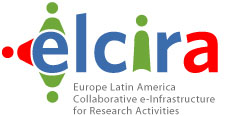 |
|
||||||
|
Interview with José Luis Quiroz In Latin America the implementation of eduroam is firmly moving forward, and one of the people who have promoted this service by putting all his faith in it, is José Luis Quiroz (INICEL and RAAP, Peru), the leader of RedCLARA’s Technical Group for Mobility. In this conversation, we can understand why he is passionate about mobility and his strong commitment to the implementation of eduroam in the region. María José López Pourailly As leader of the WG for Mobility (2011-2012) and deputy coordinator of the eduroam WG (2009-2010), you have been working for quite a while in order to bring eduroam’s benefits into Latin America, what made you set out on this journey and why do you think that establishing eduroam in our region is relevant? When we got the validation of the RADIUS server confederated from LA towards the (ETLR) server in Europe, it was a great joy! We felt linked to Europe; it was April 20th, 2011, the beginning of community integration, the bridge had already been built... The implementation of eduroam in Latin America is one of the key components of the ELCIRA project; how do you evaluate the fact that ELCIRA included this component and how do you relate to this project from your position as leader of the WG within CLARA-TEC which is struggling for the implementation of eduroam in our region? Here ELCIRA comes into play, in order to strengthen the coordination with Europe, and between Europe and the NRENs. The initiatives of both the Mobility WG and ELCIRA have the same goal, the deployment and consolidation of eduroam in Latin America and what could be better that to do so together. As the leader of the Mobility-WG I collaborate with RNP that leads ELCIRA’s Work Package 4, which is devoted to this subject. What is the current state of eduroam in Latin America? I could affirm that the next candidates to become RO are Costa Rica, Uruguay and Argentina; countries that have satisfactorily completed the authentication configuration and testing of their Federated Servers (RADIUS Proxy Servers). Costa Rica has already begun deployment at national level, followed by El Salvador, which is undergoing a process of updating its servers; I’m positive that it can easily join eduroam in the first months of 2013, since it already has experience with the configuration of its federated RADIUS server. Ecuador is performing configuration tasks in order to get its federated server, and it is very likely that Colombia joins in early 2013. It would be a great way to begin the new year... by the end of 2013 we would have six (06) more countries. Back in September this year, thanks to the coordination of RedIRIS, we exchanged emails with staff from the UNAN-León in Nicaragua so they could join eduroam. The training proposed was not carried out, but it is a good start, considering Nicaragua does not have an NREN. I think we can begin with the “evangelisation” towards the countries that do not have an NREN; this way, all or most of them would be part of the future eduroam-LA. If you were told that the immediate implementation of eduroam in all countries across the regions depends solely on your words, what would you say to the leaders from those countries in order to convince them of eduroam’s implementation?
|
|||||||
|
|||||||
